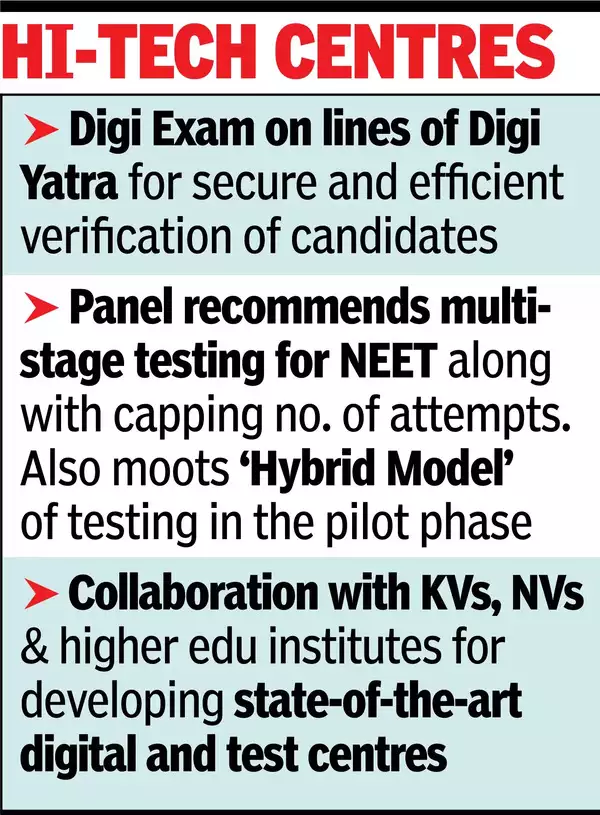NEW DELHI: A digital exam platform to prevent frauds, a hybrid model of testing, and developing 1,000 reputed govt institutions as testing centres are part of the recommendations made by the Centre-instituted seven-member panel to work on exam reforms.
The panel also called for multi-stage testing for the medical entrance – National Eligibility cum Entrance Test (NEET) along with number of attempts and suitable oversight mechanism over coaching centres.
One of the big recommendations of the committee include “Digi Exam on the lines of Digi Yatra,” – a digital examination platform inspired by the Digi Yatra initiative, which is an automated system used in Indian airports for seamless passenger travel based on facial recognition and digital processing.
According to a reliable source, “Digi Exam could mean a digital platform where candidates authenticate their identities using biometrics (e.g., facial recognition) for secure and efficient verification. This could enable a streamlined, paperless process for candidates to register, access, and complete exams, possibly even remotely.”
While the committee was set up amid allegations of NEET-UG paper leak, it was entrusted to recommend comprehensive entrance exam reforms in the country. Against this backdrop, the committee in its phase 1 implementation, recommended five-point restructuring of NTA — empowered and accountable of governing body with eminent domain experts; strengthening of the agency with additional manpower; and 10 verticals of NTA encompassing research and development, test security, test centres infrastructure, and international collaboration, among others.
The panel also recommended several measures to prevent breaches and malpractices in pen-paper test (PPT) and computer based test (CBT), biometric verification at all levels i.e., registration, test centre, and counselling and during admission time.

The phase 2 or the long-term plan called for “collaboration with KV (Kendriya Vidyalayas), NV (Navodaya Vidyalayas), higher educational institute for developing state of the art digital and test centre (physical) infrastructure, empowering of higher secondary school system, and research in educational testing.
The panel led by former Isro chief R Radhakrishnan, submitted its report to the govt last week. It also recommended major revamping of the National Testing Agency (NTA). According to govt sources, a total of 101 recommendations were made and are to be implemented in two phases.
As first reported by TOI on July 19, 2024, the committee has recommended multi-stage testing for NEET along with a number of attempts along with “Hybrid Model” of testing to be implemented in pilot phase. This would include both CBT and PPT mode (where there are logistical issues for CBT).
Apart from a robust grievances redressal system to address every grievance and communicate to all stakeholders in a timely manner, the committee also recommended an oversight mechanism over coaching centres, as well as detailed recommendations for social inclusiveness of socially disadvantaged groups and rural background students.
